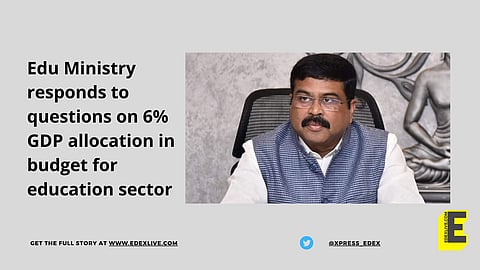

The Union Government claimed in the Rajya Sabha today, March 23, that the budget allocation for the education sector had crossed 1 lakh crore for the first time. The claims were made in the Rajya Sabha during the Question Hour. Minister of State for Education Subhas Sarkar said that a grant of Rs 6,143 crore has been provided by the 15th Finance Commission for online education and for the development of professional courses.
The question was posed by CPI(M)'s Jharna Das Baidya, who asked about the increase in investments in the education sector under the Union Budget. The MoS also answered another supplementary question on the recommendations of the 15th Finance Commission on education. Sarkar said, "A grant of Rs 4,800 crore, and to incentivise six states, each year (there will be) Rs 200 crore incentive per year per state, and also a grant of Rs 6,143 crore for online learning and development of professional courses."
Union Minister for Education Dharmendra Pradhan fielded a question on the Centre's promised budget allocation for education at the rate of six per cent of the GDP. Pradhan said that the Centre and the states would work together to increase public investment in the education sector to reach that landmark, according to a report by PTI.
The Union Government was probed further on this matter by Ram Gopal Yadav from the Samajwadi Party, who asked how long the government will take to meet the target of increasing public investment in the education sector to meet the 6 per cent GDP mark, given that it had increased from 4.07 per cent of GDP (states and Centre combined) to 4.32 per cent in five years. Sarkar did not have a definitive response, but did claim that the government had increased spending on education "significantly". He also compared the allocation to China's and said that India was doing better than other BRICS nations in this regard.
The matter of regional languages was also broached in the Upper House, with P Bhattacharya from the Congress enquiring about the importance given to regional languages in the National Education Policy (NEP) and their introduction in educational institutions up to the university level. Pradhan said, "The policy has given utmost importance to promoting critical thinking in school or higher education by making a student learn in a language that she or he is most comfortable with, which is known as the mother tongue or local language. The AICTE has already started translating engineering course books to respective languages in some parts of southern India, western India and eastern India. Also, already 14 institutions have started teaching in local languages," he said.
In response to a question on what the ministry is doing to reduce dropout rates by Bikash Ranjan Bhattacharyya of CPI(M), Pradhan said that the NEP also focused on improving the quality of education, and reducing the dropout ratio. He also mentioned that the PM Poshan Abhiyan is an "ambitious programme" in that direction. "Upgradation of education quality, teachers education quality, all these we are very much focused on, in consultation with the states. We are committed to improving the quality of teaching and learning process up to the 21st-century expectations," he said.
